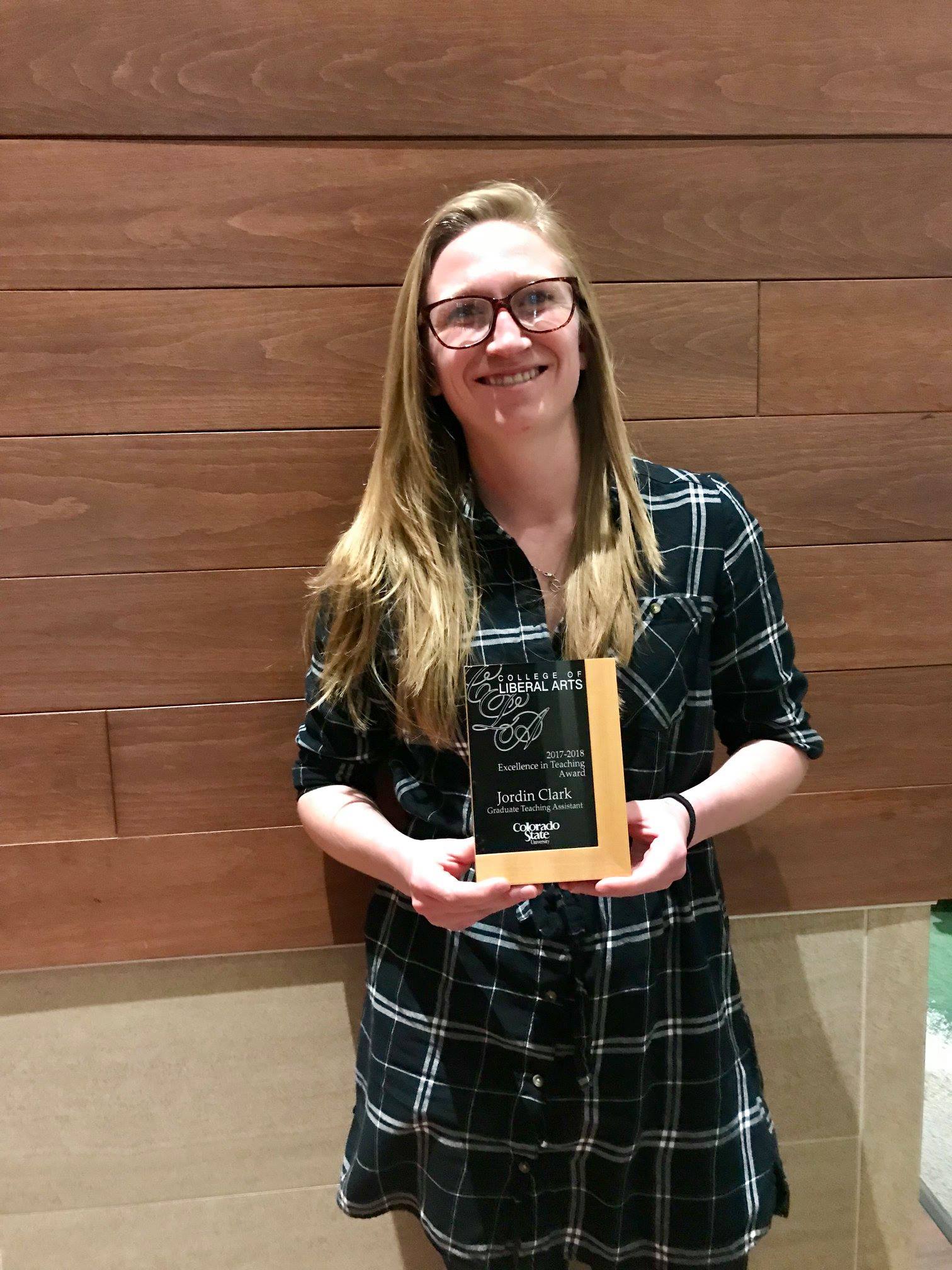 On Tuesday, April 24, Jordin Clark received the CLA Excellence in Teaching Award in the category of Graduate Teaching Assistant. The award recognizes individuals who are instrumental in students becoming lifelong learners, critical and creative thinkers, outstanding communicators, and engaged and caring citizens of their community.
On Tuesday, April 24, Jordin Clark received the CLA Excellence in Teaching Award in the category of Graduate Teaching Assistant. The award recognizes individuals who are instrumental in students becoming lifelong learners, critical and creative thinkers, outstanding communicators, and engaged and caring citizens of their community.
Clark is one of seven students in the inaugural Communication Studies Ph.D. program at CSU. She earned her M.A. in Communication Studies from CSU in 2017.
The CLA Excellence in Teaching Award is given to one Tenured Faculty, Tenure-Track Faculty, Special & Temporary Faculty, and Graduate Teaching Assistant each year.
“It was extremely surprising and I’m very happy about it,” said Clark on receiving the award. “Especially because I’m a new teacher. To think I might be doing something right is exciting.”
Clark always had a strong appreciation for learning and knew that she wanted to get a Ph.D. even as a young girl. Growing up, she also wanted to be a high school history teacher.
She teaches Public Speaking, Communication and Popular Culture, and Rhetoric in Western Thought.
“I love public speaking because it’s such a practical skill set to teach students,” said Clark. “With Communication in Popular Culture I am able to make the class my own. We get into critical thought about how media affects our lives. It’s a lot of fun to have those conversations with my students.”
Within the Communication Studies Ph.D. program, Clark studies the rhetoric of space and place. More specifically, how space and place invite us to communicate with people. For instance, she wonders, “What is it about the layout, the colors, that makes it invitational to have a conversation?”
Dr. Greg Dickinson taught her first rhetoric class and introduced her to this field of space and place. Dr. Dickinson, alongside Dr. Tom Dunn, nominated Clark for the Excellence in Teaching Award.
Surprisingly enough, Clark fell into the field of Communication Studies, and rhetoric, by accident while applying for graduate schools.
“In my mind I thought I was going into journalism or communications,” said Clark. “Then, I learned on my first day of school that I was in a different program than what I thought I was getting myself into. All I knew was that I loved learning.” She became intrigued to not only produce communication, but to figure out what existing communication does to us.
“It became way more analytical,” said Clark. “And I loved it.”
After finishing her M.A. at CSU, Clark says starting her doctorate degree is like being in a third year of the program. The biggest difference between the two programs for Clark has been a mental shift. “With Master’s its ‘I have to get through these two years’ and then you claw your way through. With a Ph.D. it’s ‘wait this is actually what I want to do with my life,’” said Clark.
As one might expect, Clark’s Ph.D. track is a full time gig, spending 60-80 hours a week reading, writing, teaching, and learning.
“It’s not easy but it’s worth it,” said Clark.
After earning her Ph.D., Clark hopes to continue with rhetoric. She wants to continue teaching as a rhetoric professor and continue researching space and place. Luckily for her, she’ll have a Ph.D., several years teaching experience, and a Excellence in Teaching Award under her belt.